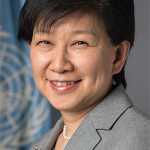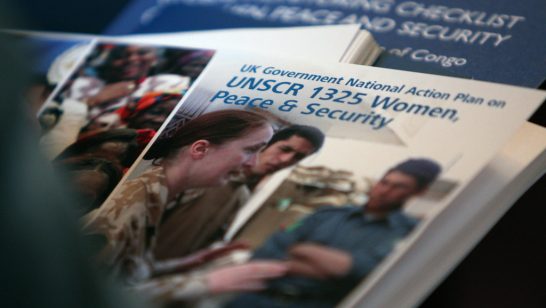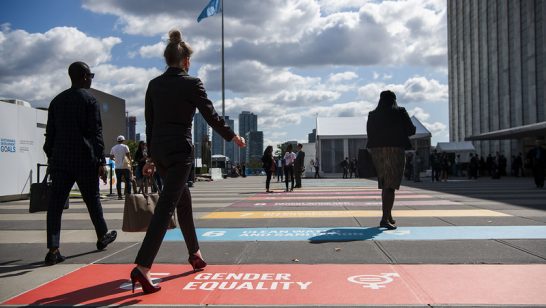
Izumi Nakamitsu, the UN’s High Representative for Disarmament Affairs, is one of the most senior women working in disarmament. She spoke to the ELN about why women need to be represented and included in disarmament, the need for youth engagement and her advice for women setting out to work in this field.
Why is it important to involve and represent more women in disarmament?
Ensuring women’s full and effective participation in disarmament is the right thing to do.
Failing to involve women, in any part of society, undermines women’s rights to participate in shaping our common future. Gender equality is a fundamental human right, but today both geopolitical tensions and the pandemic are creating risks of reversals. We need to seize the opportunity to shape a disarmament landscape that is more equal, fair, and values diversity and equality.
Women’s empowerment is also the smart thing to do. The inclusion of women in peace processes historically creates greater odds for success. Diverse and inclusive leadership is central to how we transform international peace and security. UN Secretary‑General Antonio Guterres has called to urgently redistribute power relations between women and men if we are to safeguard our future and our planet. In the UN itself, we reached gender parity among senior leaders this year, and we have introduced temporary special measures to remove the biases and obstacles to women’s equal participation at all levels. At the same time, the UN also still has a lot more work to do in this regard.
This year marks the 10th anniversary of the General Assembly resolution on Women, disarmament, non-proliferation and arms control, which recognised the need to better involve women in disarmament. Unfortunately, numbers continue to show that we lack implementation. In the disarmament and international security fields, women are still conspicuous by their absence. When diplomats met for this year’s First Committee, only one in every four statements was delivered by a woman.
Women alone do not hold the responsibility for peace, but they hold the right to be part of the decisions leading to peace. Women bring different perspectives and experiences to their roles, and the contribution of women in promoting disarmament and arms control cannot be understated. Young women activists have long been at the frontline of successful peace campaigns, with the Mine Ban Treaty as one example of many. Women peacebuilders and advocates are transforming communities around the world as they fight the proliferation of weapons.
“Women alone do not hold the responsibility for peace, but they hold the right to be part of the decisions leading to peace.”
Does the disarmament community need to be more diverse in other ways too?
The disarmament community needs to be more inclusive. With that it will also be more diverse. Adopting a more inclusive approach to international disarmament requires that we look at other forms of inequalities such as age, ethnicity, sexual orientation and disabilities, and at how these intersect.
Our efforts towards gender parity come with a cultural shift that aims to ensure that no one is left behind. We must insist that all voices are given space to be heard, so we can better understand and find solutions to our collective challenges.
Youth engagement is critical. As part of the largest generation in history, today’s young people hold tremendous power to effect change, and their ideas can help strengthen our collective peace and security—now and in the future. The UN is educating and empowering young people in disarmament through the outreach initiative “#Youth4Disarmament” through which we work with ten Youth Champions to engage their communities on disarmament, non-proliferation and arms control.
“Youth engagement is critical. As part of the largest generation in history, today’s young people hold tremendous power to effect change, and their ideas can help strengthen our collective peace and security—now and in the future.”
The ongoing pandemic has made clear that in order to create sustainable solutions to the crises we face, we must shift towards a more people-centered approach to peace and security. We must also include the voices of the people who are most impacted by war and conflict in a systematic way in arms control and disarmament policy and programmes.
Our future is best secured through global cooperation and multi-stakeholder action. Disarmament initiatives are most successful when they allow for effective partnerships among diverse representatives of the United Nations, governments, regional organisations, and civil society, including youth as well as the private sector.
How is the UN trying to break down the siloes between disarmament and other aspects of its work, such as women, peace and security?
The nexus between disarmament and the broader peace and security framework, as well as the Sustainable Development Goals and human rights, needs to be strengthened.
The Secretary General’s Agenda for Disarmament sets out different ways to better connect arms control, disarmament and other priority agendas. The Agenda is structured around four pillars: disarmament to save humanity related to eliminating weapons of mass destruction; disarmament that saves lives focused on effective restrictions and management of conventional weapons and their humanitarian impact; disarmament for future generations aimed at ensuring rapidly developing technologies are appropriately controlled; and strengthening partnerships for disarmament that bring together diverse stakeholders, including women, to shape sustainable solutions.
Disarmament, non-proliferation and arms control is a vital area for implementing the Women, Peace and Security (WPS) agenda. It intersects with all four areas of the agenda: women’s participation, protection, prevention, and relief and recovery. A new report by the United Nations Institute for Disarmament Research (UNIDIR) called Connecting the Dots: Arms Control, Disarmament and the Women, Peace and Security Agenda has helped to shed light on these often overlooked connections. Strengthening the relationship between disarmament and WPS will advance both agendas—a message that is emphasized by civil society around the world.
“Disarmament, non-proliferation and arms control is a vital area for implementing the Women, Peace and Security (WPS) agenda.”
In the UN, we partner with both the disarmament and WPS communities. One of ODA’s current flagship initiatives, funded by the European Union, is a global project that supports states and civil society to include gender elements in their small arms-related work – and vice versa.
Among the key WPS priorities identified by the Secretary-General is also a call for Member States to reduce excessive military expenditures, and for WPS and disarmament actors to join forces to review and bring spending below its current level. Already in 1979, the Convention on the Elimination of All Forms of Discrimination against Women affirmed that disarmament promotes social progress and development and, as a consequence, contributes to the attainment of full equality between women and men. Today, arms races and military spending claim growing shares of public funds that could otherwise improve the lives of people and advance gender equality.
What should member states be doing to ensure women participate fully in the NPT and contribute to its success?
During the 2019 NPT preparatory session, we saw increased interest in women’s equal participation and in gender perspectives. Three gender-related working papers were published, including one about how to improve gender equality and diversity in the NPT review process, setting out suggestions that should be encouraged in the lead up to the Tenth Review Conference.
Firstly, I urge States parties to pledge to set targets for gender balance in their delegations – to all disarmament meetings. At the conclusion of last year’s NPT preparatory session, the Chair issued a working paper in which he encouraged States parties to actively support gender diversity in their delegations to meetings related to the NPT, in accordance with Security Council resolution 1325.
As an International Gender Champion, I have made a firm commitment to promote the equal, full and effective participation of women in in all decision-making processes related to disarmament. I have also pledged not to sit on panels where only one gender is represented and urge everyone to do the same throughout the Review Conference.
Secondly, we need to collectively step up for cultural change and enabling working environments to remove biases and obstacles to women’s equal participation. The ongoing global pandemic, and its impact on women in the workforce, only further underscore this. It is not about changing women, but changing the systems that prevent them from achieving their potential. We need to better understand the forces that drive the systematic exclusion of women and other voices. For example, by making the sessions of the NPT and other meetings more family-friendly to facilitate greater compatibility of care commitments with participation in all discussions at any time of the day. This benefits not only women – but all people.
Finally, I hope for a meaningful final outcome document backed by concrete action, recognising the important contribution of women to nuclear disarmament and non-proliferation, and with practical recommendations for their equal participation in implementation of the NPT. Beyond the issue of participation, I hope that any outcome will also recognize the disproportionate impact of nuclear weapons on women and girls, including the effects of ionizing radiation.
You have said there is a particular risk of women being excluded from important debates on the interface between new technologies and arms control, owing to gender imbalances in the tech sector. Can you tell us how the UN is trying to address this? Should the tech sector, governments and philanthropists be helping, and how?
Diversity and inclusion must be at the core of our digital future. While digital technologies are rapidly transforming our societies, our IT systems are still designed, operated and secured predominantly by men. It is crucial that we have the full population on board and that we do not reproduce biases and deeply rooted patriarchal norms in society into technology.
According to the World Economic Forum, more than three quarters of cybersecurity and AI professionals are men. The ratio is similar in STEM (science, technology, engineering, and math) more broadly.
“According to the World Economic Forum, more than three quarters of cybersecurity and AI professionals are men”
We need to keep close track of gender statistics in these fields. UNIDIR has researched gender in cyber diplomacy, presenting ideas on how to promote gender considerations in cybersecurity discussions. Besides specific initiatives for promoting women in leadership positions, the study recommends initiatives that combat harmful gender stereotypes in sciences.
We need to empower women to seek opportunities in the policy areas of emerging and new technologies, AI, and cybersecurity. Women’s participation is an educational process in and of itself, and there is a need to build up expertise, through training and empowerment efforts, as well as engagement of young women. We must ensure that girls and young women are socialized into thinking that they can thrive in these domains.
Earlier this year, I gave opening remarks at the Women in International Security and Cyberspace Fellowship that promotes greater participation by women in UN discussions on international security issues related to responsible state behavior in cyberspace. I asked the women and the men leaders in cyber to encourage next generations of diplomats and students to follow in their footsteps through mentoring and to help dispel biases associated with cyber diplomacy.
For that, partnerships are key. We need a joint push from tech companies, academia, governments and other institutions that are all part of shaping the way we associate tech and gender norms. And we need men champions to bolster this effort.
“We need a joint push from tech companies, academia, governments and other institutions that are all part of shaping the way we associate tech and gender norms.”
Have you personally faced obstacles owing to your gender, and what advice would you give to women seeking to enter this space?
I started with the UN in 1989 with the UN High Commission for Refugees in Turkey, and during my posting there, I gained experience working very closely with military forces involved in relief operations in Iraq. When I went to Sarajevo in the summer of 1992 to head the UNHCR office there, which was co-located within the headquarters of the UN peacekeeping force, I was the first woman in the international staff category to be deployed in an active conflict area. At the time, it was perceived by most of the male leadership as a big “shock”, even though for me, it was simply a natural thing to do. There was a position to be filled, and my boss felt that I was the best fit, given my experience of working with the military in Iraq earlier on. Besides, half of the Sarajevo population was of course women!
It was challenging in the beginning – the humanitarian principles I tried to convey to peacekeeping military officers tended to be dismissed as “soft female” views. But, by sharing the same hardship of living in war zones; being firm and persistent, yet not aggressive, in my communication; presenting clear logic and offering solutions to the acute humanitarian challenges, I did manage to establish good working relations based on mutual respect. And this experience has guided me throughout my career in other postings, including previously in peacekeeping and now in disarmament.
To women seeking to work in disarmament and international security, I would say two things:
First, you are in good company. Don’t forget there are ample examples of women leaders in disarmament processes. And, don’t forget that there are many male leaders today who value contributions made by women and men alike.
“Don’t hold back from expressing where you want to go and voice any injustices and unnecessary obstacles emerging on the path to getting there.”
Second, remember that your experiences and perspectives are valued and needed. Believe in yourself, that you will make important contributions. Of course, you must also continuously make efforts to develop and grow. Don’t hold back from expressing where you want to go and voice any injustices and unnecessary obstacles emerging on the path to getting there. Be assured that you have the support of many women and men leaders, me included, to claim your rightful seat at the table.
The opinions articulated above represent the views of the author, and do not necessarily reflect the position of the European Leadership Network (ELN) or any of the ELN’s members. The ELN’s aim is to encourage debates that will help develop Europe’s capacity to address pressing foreign, defence, and security challenges.
Image: Flickr, The Official CTBTO Photostream



